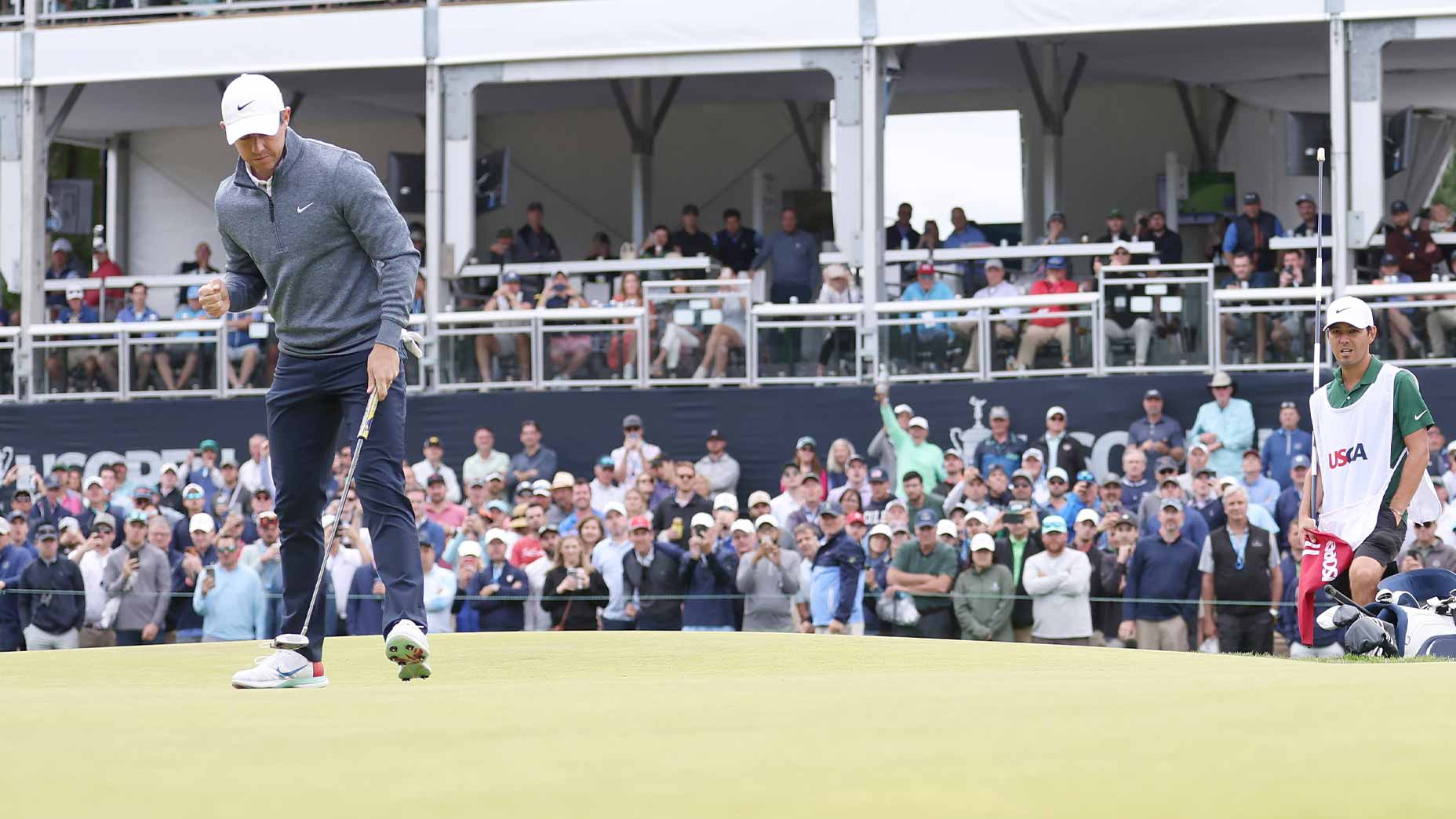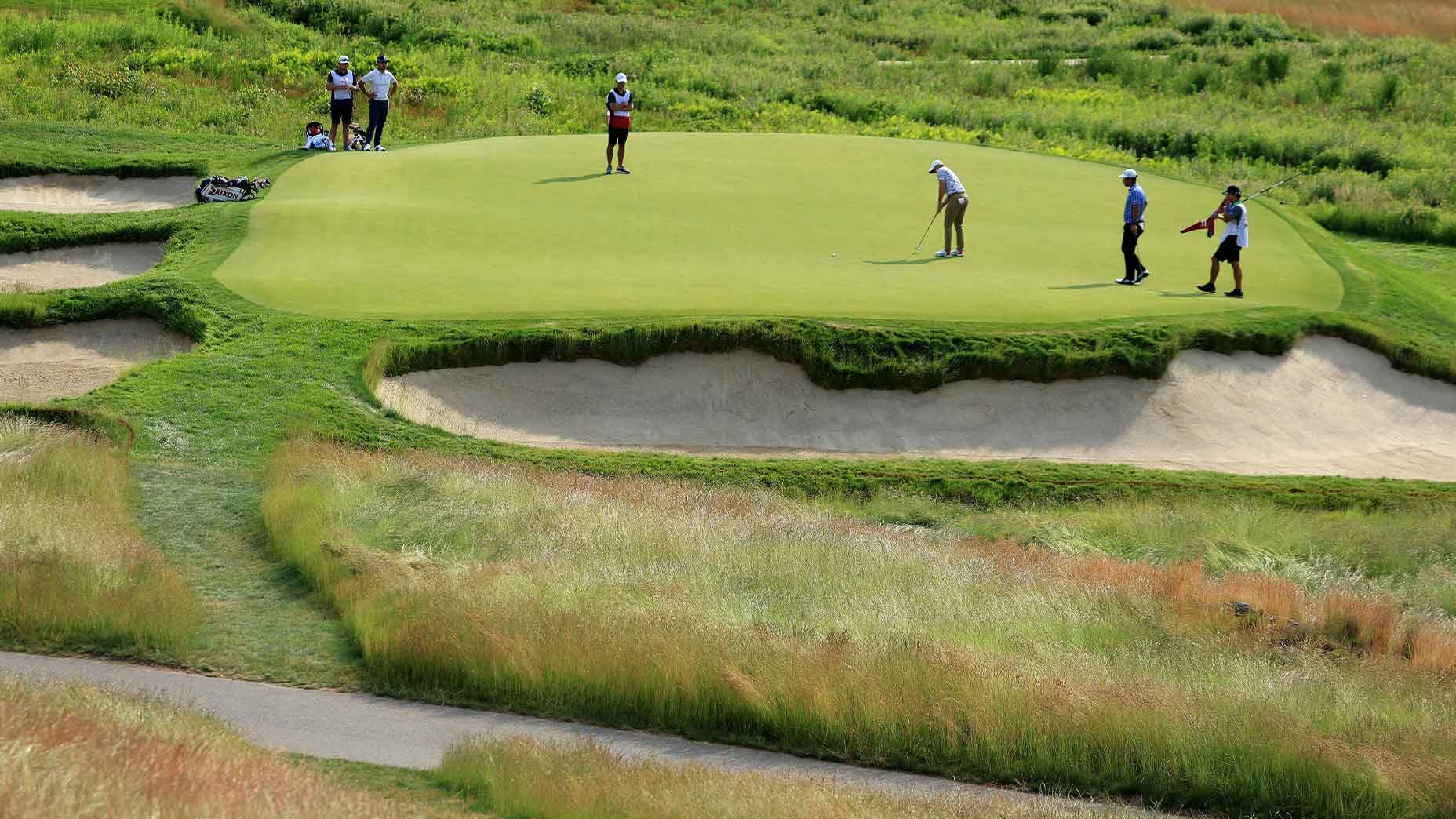BROOKLINE, Mass. — On a gray Saturday in Boston, Rory McIlroy stumbled his way to the 11th tee box at the U.S. Open looking much the same.
Just hours earlier, McIlroy had entered the day at four under, one stroke off the lead. But then came the wind, the cold, and for McIlroy, the inevitable: three bogeys, including two consecutive to start his third round. He was back to one under, three strokes off the mark now held by Will Zalatoris and a suddenly charging Matthew Fitzpatrick.
McIlroy struck his tee shot on the devilish, 131-yard par-3 and immediately recoiled. He hated it. But then it returned to earth, and he seemed to change his mind. Probably because it was 12 feet from the flagstick.
He disappeared from the tee box and was soon drowned in cheers. The few thousand fans packed into the amphitheater-style 11th had waited all day for a moment, and now they finally had it.
The U.S. Open’s best hole is also its tiniest — and most devilishBy: James Colgan
Quickly, a chant broke out. The grandstand on the right of the green was first, but the one on the left quickly followed suit.
“Let’s go Ro-ry!” they clapped.
McIlroy did not react. He surveyed his putt — a tricky uphill try that bent over a ridge and snapped left. Finally, he rocked his putter back and through. His ball trickled carefully down the spine and toward the hole.
McIlroy, who putted from 12 feet, was already 8 feet from the flagstick when his ball finally plunged in. Mid-stride, he stuck out his fist in quick celebration, and the crowd erupted once more.
“RO-RY! RO-RY! RO-RY!”
It was 5:49 p.m. ET on Saturday, and the golf tournament had finally become a U.S. Open.
Rory McIlroy records his first birdie of the day at the 11th.
— Golf Channel (@GolfChannel) June 18, 2022
He's right back in the mix at the #USOpen.
:📺: @NBC & @PeacockTV pic.twitter.com/H8KYuqiVzs
Or was it earlier?
The wind gusted into Brookline sometime Saturday morning; a harsh, cutting breeze that sunk its teeth into the tournament for the first time all week. There was not a single approach struck in round 3 that wasn’t meaningfully affected by the wind.
“There were some big changes,” Zalatoris, the 54-hole co-leader said. “I think I had, like, 312 into 14 on Thursday, and then I had 258 to the front today.”
Zalatoris, the PGA Championship runner-up, finished the day at four under, tied with Fitzpatrick. Just one back of Zalatoris and Fitzpatrick sits Jon Rahm, the defending champ who actually led on the 18th tee on Saturday but made double bogey. Keegan Bradley, Adam Hadwin and Masters champ Scottie Scheffler are two off the lead.
On Saturday, Zalatoris survived through the gusts to shoot a three-under 67 (an “unbelieeeeevable” score, according to McIlroy). And he did it with a brand of golf that’s served him well in big moments before: steady, sharp and, above all, safe.
“Yeah, that was brutal,” he said. “I think it took a lot of discipline today. I mean, we didn’t aim at a single flag even with some wedges, just because you really only have a foot or two to deal with on these greens in some situations.”
His round started at 1:39 p.m., but is it possible the turning point came even earlier?
The Country Club was as hard as it has ever been on Saturday, a fact that was true even with the very first group of the day. For the first time all week, the USGA stopped watering, syringing and otherwise softening the fairways, letting them reach peak levels of bounciness. The rough was thicker than a bowl of molasses. The greens — which were already rude — were double-cut and rolled before play began.
The result was a brutally difficult setup, in brutally difficult conditions, on a brutally difficult golf course — in other words, a true U.S. Open.
The USGA says it double-cut and rolled the greens before today's round. Also applied water "as needed to maintain turf health." Rolling upper 12s on the Stimp. Given how slopey these greens are, I think this means they want a little spice.
— Dylan Dethier (@dylan_dethier) June 18, 2022
“It’s great. I said to Bones walking up 18, this is how a U.S. Open should be,” Justin Thomas said. “It’s very difficult. Par is great score on a lot of holes. Bogeys aren’t going to kill you. We don’t do this very often, and I think it’s very, very fitting and totally acceptable to have this kind of test and this difficult setup for a U.S. Open, and it’s strictly because of conditions.”
Thomas did not fare as well, but he was hardly alone. The scoring average was nearly a stroke higher on Saturday than the average from the first two rounds. For those who survived to the weekend, the punishment came in the form of the golf course. The conditions were cruel often and they were cruel early.
“Probably my second shot on 1,” McIlroy said of his own turning point. “I landed it maybe 5 or 10 on the green. If you look at my shot yesterday into that hole from the left rough, it stopped pretty quickly and I left myself 15 feet below the hole for birdie. Had a similar shot today, and the thing just bounded through the back of the green. That’s when I knew the golf course had turned a little bit.”
It’s shaping up to be a chilly evening in Boston, with an even chillier Sunday in the books. When play begins, the rough will be even longer, the fairways even firmer and the greens even faster. Even-par might be a great score on Sunday, and it’s anyone’s guess as to where the winning score will land.
This is the reality we had long been promised at Brookline, and it is the reality we have found. There is question as to the time, but there is no question about the truth.
On Saturday, the U.S. Open got real.


